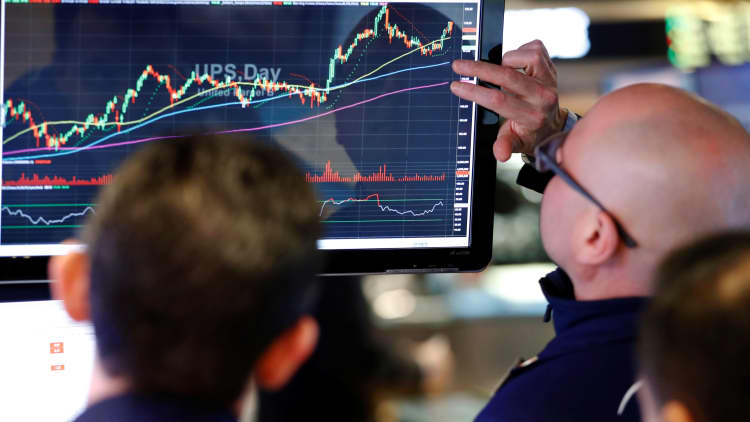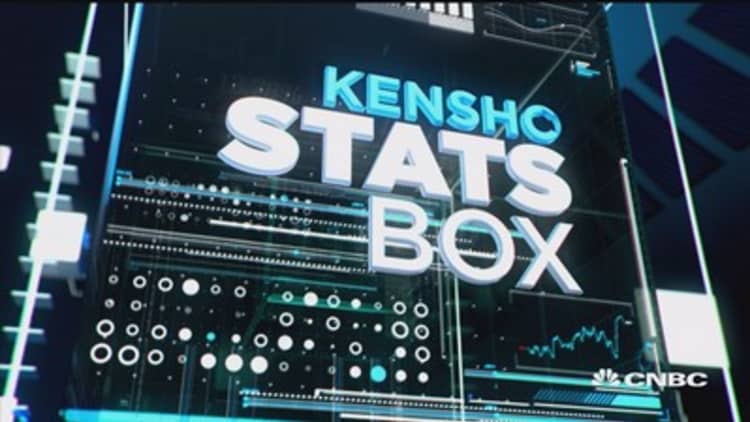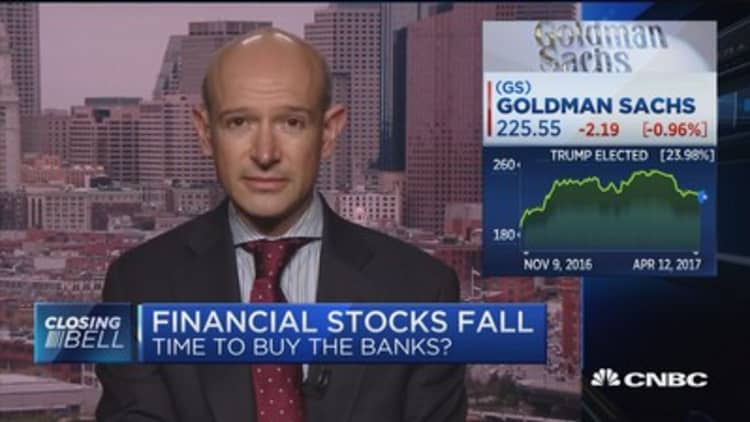
The Trump administration jumped into global hot spots with both feet in the past week, bombing Syria in its first major military action and threatening to move unilaterally against North Korea over its nuclear program.
Both of those events unsettled markets and sent investors looking for cover in the safety of bonds and gold. Add to that Trump's comments, in a Wall Street Journal interview Wednesday, that the dollar is getting too strong, and he's helped set up some very important technical moves across financial markets.
While the market moves haven't been deep, they have been surgical. Many of them are technically significant or a return to levels last seen right around the election. The stock market is still up sharply, with the up more than 9 percent since Election Day.
But both the S&P 500 and the Dow on Wednesday closed below their 50-day moving averages, a technical threshold they last closed under right around Election Day. The S&P fell below its 50-day of 2,351, declining 8 points to 2,344, while the Dow finished Wednesday beneath its 50-day, losing 59 points to 20,591.
The 50-day moving average is just what it sounds like — the average of the last 50 days of closing prices, and technical strategists look at a close below that average as a set up for a potential sell off. Traders will be watching how the stock market moves off of this level Thursday.
The Trump administration foreign policy maneuvering comes at the same time global investors are already on edge about the potential for the National Front candidate Marine Le Pen to win the French presidential election. While not expected, a victory by Le Pen could lead to France leaving the euro zone. The first round vote is April 23.
"I think people are afraid of it so they're reducing positions. When everything is said and done, the S&P is still in this year's trading range and we're still in the middle of it. We haven't had a deep enough pullback to expose new value," said Marc Chandler, head of foreign exchange strategy at Brown Brothers Harriman.
Tensions have been running high and filtering through to markets, but stocks cut some losses and the dollar strengthened Wednesday after Russia and the U.S. showed a willingness to work on their relationship and some thorny issues like Syria and North Korea.
U.S. Secretary of State Rex Tillerson held a press briefing with his Russian counterpart, after Tillerson met with Russian President Vladimir Putin. Trump's comments, reported after the briefing, sent the dollar reeling.
Tillerson said the two countries agreed that terrorists should be removed from Syria and North Korea should be denuclearized, but they didn't agree on who was behind the the chemical weapons attack in Syria. He added that the U.S. and its allies would not support a government headed by Syrian President Bashar Al-Assad, who is backed by Russia.
"On the margin, it's an easing of tension. ... The U.S. missile attack is not the beginning of a wholesale military involvement in Syria. North Korea, not clear," said Chandler, after the press briefing.
Markets this week have been very sensitive to speculation about North Korea. Traders have been chatting about whether the country could launch missiles this weekend to commemorate its Sun Day, a holiday honoring the birth of its founder, Kim Il-sung.
One of the more profound market moves in the past week was in the bond market, where the 10-year yield was seen to be at an inflection point Wednesday, trading below the key 2.30 percent level. The 10-year has been locked roughly in a range between 2.30 and 2.60 for months. The yield last traded consistently below that 2.30 level in early November though it has tested it several times.
After Trump's remarks to The Wall Street Journal, the 10-year yield dipped further to 2.24 percent, the lowest since November.
"Geopolitical concerns are certainly the driver," said BMO fixed income strategist Aaron Kohli of the broader move lower. But he said Trump's dollar comment really gave it a push. He said the move started in earnest several weeks ago, when Republicans failed to vote on the health care bill, disappointing investors who were hoping Washington would complete that and move "quickly to tax reform.
Wells Fargo strategist Michael Schumacher said the market may have underestimated the risk from the French election, but that it's been adjusting for the risk.
"You think about the good old days when the markets were driven by growth and inflation. It's hard to anticipate what's on Twitter," said Schumacher.
Another technical factor watched in the Treasury market is the spread between the yields on two-year and 10-year notes, which fell this week to the lowest level since the election. That so-called flattening is sometimes indicative of concerns about a weakening economy, or one where the Fed is raising interest rates too quickly.
There was also a pretty dramatic move this week in the stock market's fear gauge, or the VIX, up 25 percent week to date. The VIX reflects trading in the S&P 500 puts and call options traded on the CBOE, and rises when markets are seen as fearful.
"The VIX confirmed a breakout above its 200-day moving average [Monday], supporting a pickup in volatility in the days ahead. We expect the inversely correlated SPX [S&P 500] to break its 50-day moving average in a short-term setback that will lead to a retest of March's low," said Katie Stockton, technical analyst at BTIG, said in a note.

Gold also got another lift after Trump's dollar comment, and futures were trading at $1,283 per troy, the highest level since November.
Chandler also noted that the Korean stock market and currency both snapped a six-day losing streak, even with the tensions. He also said the spread between the French 10-year and German bund narrowed. That spread is seen as a "fear gauge" for the French election.
For technicians, the moves in the stock market below the 50-day and the 10-year yield below 2.30 percent will be more significant if markets close below those levels.
The S&P 500 last closed below the 50-day moving average on Nov. 8, and the Dow last closed below its 50-day on Nov. 7.
Besides watching markets, traders will be watching PPI inflation data and weekly jobless claims at 8:30 a.m. ET.
Watch: Time to buy the banks?



